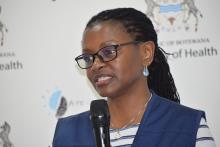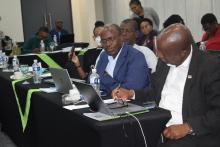Towards Building Resilience: Sensitizing Health Professionals on Climate Change and Health in Botswana
On the 17th of September 2024, WHO country office in collaboration with other stakeholders including Meteorological Services, Southern African Science Service Centre for Climate Change and Adaptive Land Management (SASSCAL) and UNDP supported Ministry of Health in hosting a successful sensitization workshop under the theme” Role of Health Professionals on the Climate Change and Health”. The event gathered health professionals, policy makers, academia, researchers, and climate experts to address the urgent nexus between climate change and health in Botswana.
It featured in-depth presentations, discussions, and planning sessions aimed at equipping participants with strategies to create a more resilient health sector capable of addressing climate impacts. WHO country office provided an overview of climate change impacts on health in the African region emphasizing the magnitude of climate change impacts. Over 56% of public health emergencies in the African region between 2001 and 2021 were climate related. Projections indicate that by 2030, climate change could lead to 250,000 deaths annually in Africa due to malnutrition, malaria, diarrheal diseases, and heat stress. About 28% of all premature deaths globally are attributed to environmental factors, underscoring the urgent need for robust health systems in Botswana. WHO is committed to supporting the country to enhance its climate resilience by implementing existing frameworks on climate change that is the Libreville declaration on Health and Environment in Africa and the Regional strategy for the management of Environmental determinants of Human Health in the African region (2022-2032) and theCOP26 Health Declaration. The WHO country Officer In-Charge, Dr. Juliet Bataringaya emphasized that extreme weather events and climate shifts threaten public health, ecosystems, food security, and access to clean water. She pointed out that research supported by WHO indicates that approximately 3.6 billion people live worldwide live in highly vulnerable to climate-risks, with projected health-related related economic damages ranging from $2–4 billion annually by 2030.
Dr Bataringaya stressed the importance of accelerated adaptation efforts coordinated responses to build climate-resilient health systems. Mr. Samuel Kolane, Director of Public Health, emphasized the urgent need to address the escalating health risks from extreme weather events such as heatwaves, droughts, and heavy rainfall. He highlighted the growing prevalence of health issues like cardiovascular and respiratory diseases, mental health conditions, and post-traumatic stress disorders linked to environmental factors. He called for collective action and robust implementation of climate-sensitive health policies to mitigate these impacts and foster healthier environments through adaptive strategies. The presentations by the Southern African Science Service Centre for Climate Change and Adaptive Land Management (SASSCAL) on Botswana’s climate challenges highlighted alarming trends of rising temperatures, prolonged droughts, unpredictable rainfall, highlighting the vulnerability Botswana’s semi-arid conditions. The impacts include increased risks of heat-related illnesses, waterborne diseases like cholera, and vector-borne diseases such as malaria. Participants were implored to integrate climate risk management into health policies and strengthen community education.
Additionally, The Ministry of Environment and Tourism outlined Botswana’s strategic efforts to adapt to climate change, its national policy responses, and participation in international climate negotiations. The presentation emphasized the need for integrated approaches to strengthen resilience across sectors, with a particular focus on health. The UNDP presentation addressed financing challenges and opportunities, noting the high adaptation finance needs for developing countries, estimated at $387 billion. Limited preparedness has hindered Botswana’s access to such funds, emphasizing the importance of aligning national priorities with funding opportunities to attract multilateral support. The workshop concluded with the official launch of the Climate Change and Health Vulnerability and Adaptation Assessment, which was set to begin in September and run until December 31, 2024.




